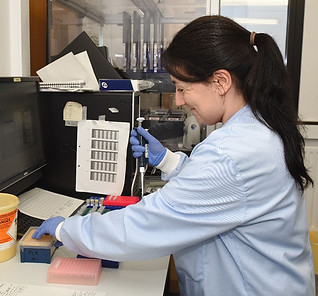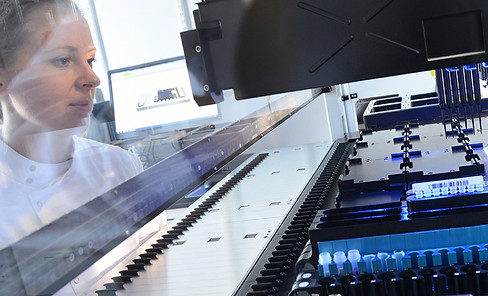Excellent progress by Scotland's flagship study seeking causes of rare genetic conditions
"The success of this project so far has come from a real team effort by NHS and University staff right across Scotland. This collaborative approach is an important strength of SGP."
Professor Zosia Miedzybrodzka, SGP Genomics of Rare Disease Project Lead
and Professor of Medical Genetics at the University of Aberdeen
18th June 2018
Scottish Participation in the 100,000 Genomes Project is on track
The team behind Scottish participation in the 100,000 Genomes Project is delighted to announce that they are on track to deliver the project’s objectives. Recruitment to this important research study is almost complete, with DNA samples from more than 500 people having been sent for whole genome sequencing. It is hoped that the research will pave the way for more diagnoses and better lives for patients with rare genetic conditions.
Through the four Scottish NHS regional genetics clinics and laboratories, the Scottish Genomes Partnership (SGP) is recruiting 1,000 participants as part of the Genomics England 100,000 Genomes Project. This is a UK-wide initiative to find out how whole genome sequencing and genomic analyses can be used in the NHS to improve diagnosis and management of rare conditions.
The NHS Scotland Genetics clinics, which provide patient services right across Scotland, began recruitment to the study in spring 2017. They have now identified enough families to fill all the places. By early June 2018, two thirds of participants (665) had been formally consented into the study. This means that they have responded positively to an invitation to take part, have received all the study information and, after an opportunity to discuss this further and ask questions, have decided to sign up to take part.

DNA for the Scottish Participation in the 100,000 Genomes Project is being extracted in the NHS Genetics Laboratories
The participants are individuals diagnosed with rare conditions and where possible one or two members of their close family. Involvement of close relatives is important - it allows direct comparison to be made between the genetic material of members of the same family in order to rule out those parts of the genome not involved in development of the rare condition. This helps us identify which genetic changes do lead to health problems. For the first time in Scotland, the SGP research team has ethical approval to recruit adults with incapacity to a genetic study. Everyone taking part hopes to learn about the causes of their family member’s condition.
Whole genome sequencing for the Scottish participants is being done within Scotland at the state-of-the-art Edinburgh Genomics Clinical facility. Nearly 500 DNA samples provided by NHS Scotland laboratories have already been sequenced for this study. After passing local quality control checks the data can be transferred securely to Genomics England for clinical interpretation. The SGP research team has worked systematically with Genomics England over the last year to help them make technical modifications so that the Scottish data can be analysed alongside other UK data in the 100,000 Genomes Project.

DNA for the Scottish Participation in the 100,000 Genomes Project is being sequenced at the Edinburgh Genomics clinical facility
By early June, NHS Scotland data for 358 participants (135 families) had been added to the analysis pipeline, and data for all 1,000 participants are expected to be there before the end of 2018.
Initial analysis for the Scottish study is underway at Genomics England, including comparisons with data from more than 55,000 other participants (so far) from across the UK. The first clinical results are eagerly anticipated and some pilot analysis is also happening in Scotland through University experts. The NHS Scotland laboratories will play a vital role in checking findings and discussing them with clinical colleagues before any feedback can be given to the families. The clinical interpretation process for whole genome sequencing is complex and will continue to evolve as researchers learn more about the human genome in health and disease.